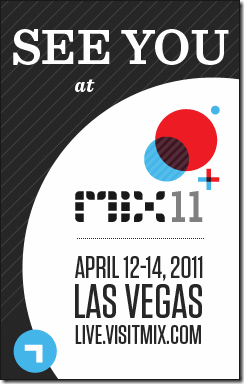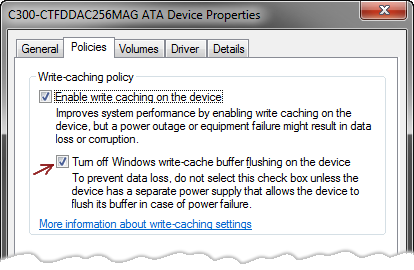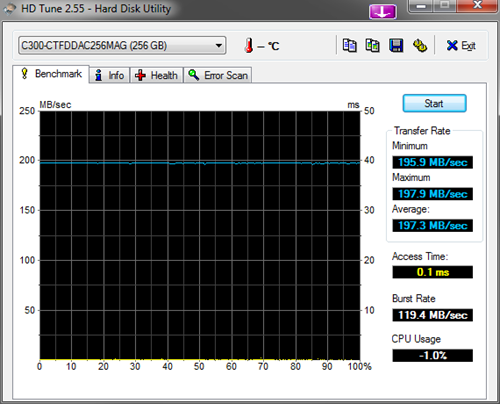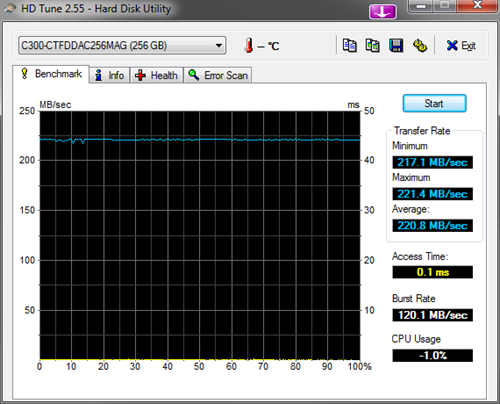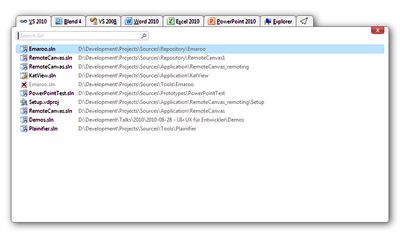Roland Weigelt
Born to Code
-
dotnet Cologne 2011 : Anmeldung ab 14. März
Am 6.5.2011 findet in Köln die dotnet Cologne 2011 statt, eine von der .NET User Group Köln und der von mir geleiteten Gruppe Bonn-to-Code.Net gemeinsam organisierte Community-Konferenz rund um .NET.
Die “dotnet Cologne” hat sich mittlerweile als die große .NET Community- Konferenz in Deutschland etabliert. So war die letztjährige dotnet Cologne 2010 mit 300 Teilnehmern bereits einen Monat im Voraus ausgebucht.
Und heise online schrieb: “Inzwischen besitzt die dotnet Cologne ein weites Einzugsgebiet. Die Teilnehmer kommen nicht mehr ausschließlich aus dem Kölner Umfeld, sondern aus allen Teilen Deutschlands [...] Die gute Qualität des Vorjahres in Verbindung mit einem geringen Preis hat sich schnell herumgesprochen, sodass Teilnehmer aus Bayern oder Thüringen keine Ausnahme waren.”
Auch in diesem Jahr erwartet die Teilnehmer ein ganzer Tag voll mit Themen rund um .NET. Auf der Website http://www.dotnet-cologne.de sind dazu jetzt die ersten Vorträge, Sprecher sowie Infos zur Anmeldung veröffentlicht.
Die Anmeldung ist ab Montag, den 14.3.2011 um 14:00 freigeschaltet.
Es empfiehlt sich, schnell zu handeln, denn für die 100 ersten Teilnehmer gilt der “Super-Early Bird” Preis von nur 25,- Euro; diese Plätze waren letztes Jahr in Nullkommanix weg.
Die Teilnehmer 101 – 200 zahlen den “Early Bird” Preis von 40,- Euro, ab Platz 201 gilt der “Normalpreis” von 55,- Euro.
Aber egal ob “Super-Early”, “Early” oder “Normal”: 25 Vorträge auf 5 Tracks, gehalten von bekannten Namen der .NET Community, dazu den ganzen Tag über Verpflegung und Getränke – das ist zu diesem Preis ein sehr attraktives Angebot.
Wir haben damit eine Konferenz organisiert, die wir selbst gerne besuchen würden. Ganz im Sinne “von Entwicklern, für Entwickler”.
Was ist neu?
Das Feedback vom letzten Jahr war sehr positiv, den Leuten hat’s einfach gut gefallen. Gleichwohl haben wir Feedback-Bögen, Blog-Einträge und Tweets sehr aufmerksam ausgewertet und bei der Organisation berücksichtigt:
- Der neue Veranstaltungsort, das Komed im Mediapark Köln, ist zentral gelegen und verfügt über günstige Parkmöglichkeiten
- Die Räumlichkeiten bieten mehr Platz für Teilnehmer, Sponsoren und natürlich auch das Mittagessen
- Wir haben dieses Jahr einige etwas speziellere Vorträge auf Level 300 und 400 im Programm, um neben fundierten Einführungen in Themengebiete auch “Deep Dives” für Experten anbieten zu können.
- Längere Pausen zwischen den Vorträgen ermöglichen es den Teilnehmern besser, nach den Vorträgen mit den Sprechern verbleibende Fragen zu klären, sich an den Sponsorenständen Infos zu holen oder einfach Kontakte mit Gleichgesinnten zu knüpfen.
Was das Fördern der Kommunikation unter den Teilnehmern angeht, haben wir schon die eine oder andere Idee im Kopf. Aber einiges davon hängt nicht zuletzt von finanziellen Faktoren ab – und damit sind wir schon beim Thema:
Es gibt noch Sponsoring-Möglichkeiten!
Die dotnet Cologne 2011 ist die Gelegenheit, Produkte vorzustellen, neue Mitarbeiter zu suchen oder generell den Namen einer Firma bei den richtigen Leuten zu platzieren. Nicht ohne Grund unterstützen uns viele Sponsoren dieses Jahr zum wiederholten Mal. Vom Software-Sponsor für die Verlosung bis hin zum Aussteller vor Ort – es gibt vielfältige Möglichkeiten und wir schicken auf Anfrage gerne unsere Sponsoreninfos zu.
-
Fünf Jahre Bonn-to-Code.Net – das muss gefeiert werden!
Als ich am 1. Januar 2006 die .NET User Group “Bonn-to-Code.Net” gründete (den genialen Namen ließ sich mein Kollege Jens Schaller in Anlehnung an das Motto meines Blogs einfallen), ahnte ich nicht, wie schnell sich alles entwickeln würde. So konnte, nach ein wenig Werbung über diverse Kanäle, bereits am 14. Februar 2006 das erste Treffen stattfinden und wenige Tage später wurde Bonn-to-Code.Net offiziell in den Kreis der INETA User Groups aufgenommen.
Das ist nun etwas über fünf Jahre her und soll am 22. März 2011 um 19:00 (Einlass ab 18:30) gebührend gefeiert werden, und zwar im Rahmen unseres März-Treffens.
Der Abend bietet Vorträge zu “Flow Design und seine Umsetzung mit Event Based Components” sowie “WCF Services mal anders” (ausführlichere Infos zu den Vortragsinhalten gibt es hier).
Anschließend gibt es bei einer großen Verlosung neben Büchern auch hochkarätige Software-Preise zu gewinnen. Zusätzlich zu Lizenzen für JetBrains ReSharper und Telerik Ultimate Collection warten dieses Mal (mit freundlicher Unterstützung durch Microsoft Deutschland) je ein Windows 7 Ultimate und ein Office 2010 Professional Plus auf ihre glücklichen Gewinner. Und wer nicht zu spät kommt, kann auch ganz ohne Losglück eines von vielen kleinen Goodies abgreifen.
Eine Anmeldung ist nicht erforderlich, eine Anfahrtsbeschreibung gibt es auf der Bonn-to-Code.Net Website.
Es freut mich dabei besonders, dass wir zu diesem Termin u.a. einen Sprecher an Bord haben, der bereits beim Gründungstreffen dabei war: Stefan Lieser. Mittlerweile z.B. durch die Clean Code Developer Initiative bekannt, ist Stefan nur ein Beispiel für eine ganze Reihe von Sprechern auf den diversen Entwicklerkonferenzen, die ihre ersten Erfahrungen u.a. bei Bonn-to-Code.Net gemacht haben.
…und was ist in den fünf Jahren so passiert?
Einiges! Ein Community Launch Event in 2007, zwei Microsoft TechTalks (2007,2008), Gastsprecher aus ganz Deutschland und dem Ausland (JP Boodhoo, Harry Pierson). Doch nichts hat die fünf Jahre so geprägt wie die Zusammenarbeit mit “den Nachbarn aus Köln”.
Zum Zeitpunkt der Gründung von Bonn-to-Code.Net gab es im gesamten Köln/Bonner Raum keine .NET User Group. Und so war es nicht ungewöhnlich, dass der erste Interessent, der sich auf meinen Blog-Eintrag vom 4. Januar 2006 hin meldete, aus Köln stammte: Albert Weinert.
Kurze Zeit nach der Bonner Gruppe wurde dann – initiiert durch Angelika Wöpking und Stefan Lange – schließlich die .NET User Group Köln gegründet. Wobei Stefan wiederum vor dem Kölner Gründungstreffen Ende April bereits Bonner Treffen besucht hatte; insgesamt also eine Menge personeller Überlapp zwischen Köln und Bonn.
Als nach einem etwas holprigen Start der Kölner Gruppe schließlich Albert und Stefan die Leitung übernahmen, war klar dass Köln und Bonn in vielerlei Hinsicht eng zusammenarbeiten würden. Sei es durch die Koordination von Themen und Terminen oder auch durch Werbung für die Treffen der jeweils anderen Gruppe.
Der nächste Schritt kam dann mit der Beteiligung der Kölner und Bonner Gruppen an der Organisation des “AfterLaunch” im April 2008. Der große Erfolg dieser Veranstaltung war der Ansporn, in Bezug auf die Zusammenarbeit ein neues Kapitel aufzuschlagen.
Anfang 2009 wurde zunächst der dotnet Köln/Bonn e.V. gegründet, um für eigene Großveranstaltungen ein solides Fundament zu schaffen. Im Mai 2009 folgte dann die erste “dotnet Cologne” – ein voller Erfolg. Und mit der “dotnet Cologne 2010” etablierte sich diese Konferenz als das große .NET Community Event in Deutschland.
Am 6. Mai 2011 findet nun die “dotnet Cologne 2011” statt; hinter den Kulissen laufen die Vorbereitungen dazu bereits seit Monaten auf Hochtouren.
Alles in allem sehr aufregende fünf Jahre, in denen viel passiert ist. Mal schauen, wie die nächsten fünf Jahre werden…
-
MIX11 – I’ll be there!
In about 6 weeks I’ll start packing my bags, getting ready for my trip to MIX11.
MIX10 was a great experience so I don’t mind the long hours in the cramped space of economy class during my flight from Germany to Vegas. Let’s hope that the Silverlight sessions don’t clash as much with the UX sessions as they did last year.
-
dotnet Cologne 2011 - Call for Papers
Am 6. Mai 2011 findet im MediaPark Köln die dotnet Cologne 2011 statt, die große .NET Community Konferenz in Deutschland. Bereits zum dritten Mal organisieren die .NET User Groups aus Köln und Bonn einen ganzen Tag voll mit Vorträgen rund um .NET.
Damit diese Konferenz von Entwicklern für Entwickler wieder ein solcher Erfolg wie im letzten Jahr wird, suchen wir (Stefan Lange, Albert Weinert und ich) noch Sprecher mit interessanten Vorträgen – von der Einführung in neue Themen bis hin zur Level 400 “Hardcore” Session zu etablierten Technologien.
Wer Interesse hat: Alle Infos zum Call for Papers gibt es hier.
-
Welcome 2011
Things that happened in 2010
- MIX10 was absolutely fantastic. Read my report of MIX10 to see why.
- The dotnet Cologne 2010, the community conference organized by the .NET user group Köln and my own group Bonn-to-Code.Net became an even bigger success than I dared to dream of.
- There was a huge discrepancy between the efforts by Microsoft to support .NET user groups to organize public live streaming events of the PDC keynote (the dotnet Cologne team joined forces with netug Niederrhein to organize the PDCologne) and the actual content of the keynote. The reaction of the audience at our event was “meh” and even worse I seriously doubt we’ll ever get that number of people to such an event (which on top of that suffered from technical difficulties beyond our control).
- What definitely would have deserved the public live streaming event treatment was the Silverlight Firestarter (aka “Silverlight Damage Control”) event. And maybe we would have thought about organizing something if it weren’t for the “burned earth” left by the PDC keynote. Anyway, the stuff shown at the firestarter keynote was the topic of conversations among colleagues days later (“did you see that? oh yeah, that was seriously cool”).
Things that I have learned/observed/noticed in 2010
- In the long run, there’s a huge difference between “It works pretty well” and “it just works and I never have to think about it”. I had to get rid of my USB graphics adapter powering the third monitor (read about it in this blog post). Various small issues (desktop icons sometimes moving their positions after a reboot for no apparent reasons, at least one game I couldn’t get run at all, all three monitors sometimes simply refusing to wake up after standby) finally made me buy a PCIe 1x graphics adapter. If you’re interested: The combination of a NVIDIA GTX 460 and a GT 220 is running in “don’t make me think” mode for a couple of months now.
- PowerPoint 2010 is a seriously cool piece of software. Not only the new hardware-accelerated effects, but also features like built-in background removal and picture processing (which in many cases are simply “good enough” and save a lot of time) or the smart guides.
- Outlook 2010 crashes on me a lot. I haven’t been successful in reproducing these crashes, they just happen when every couple of days on different occasions (only thing in common: I clicked something in the main window – yeah, very helpful observation)
- Visual Studio 2010 reminds me of Visual Studio 2005 before SP1, which is actually not a good thing to say about a piece of software. I think it’s telling that Microsoft’s message regarding the beta of SP1 has been different from earlier service pack betas (promising an upgrade path for a beta to the RTM sounds to me like “please, please use it NOW!”).
- I have a love/hate relationship with ReSharper. I don’t want to develop without it, but at the same time I can’t fail to notice that ReSharper is taking a heavy toll in terms of performance and sometimes stability.
Things I’m looking forward to in 2011
- Obviously, the dotnet Cologne 2011. We already have been able to score some big name sponsors (Microsoft, Intel), but we’re still looking for more sponsors. And be assured that we’ll make sure that our partners get the most out of their contribution, regardless of how big or small.
- MIX11, period.
- Silverlight 5 is going to be great. The only thing I’m a bit nervous about is that I still haven’t read anything official on whether C# next version’s async/await will be in it. Leaving that out would be really stupid considering the end-of-2011 release of SL5 (moving the next release way into the future).
- MIX10 was absolutely fantastic. Read my report of MIX10 to see why.
-
How a Firefox Issue Turned out to be a SSD Problem
I’ve used the holidays to finally install Windows 7 (x64) on my desktop computer. Vista x64 did a fine job, but compared to the Windows 7 system on my notebook it felt kind of old. And as a small Christmas present to myself, I decided to install the system on an SSD (a Crucial C300 SSD 256GB).
A fresh install of Win 7 on a new SSD in a computer which (under Vista) has already proven to be a great development and gaming machine – should be a killer combo, right?
Well, not quite. The first experiments after setting up the system were kind of sobering. The system, while being really fast, felt kind of sluggish every now and then. And that didn’t change after the computer ran for a while (i.e. building the search index was no longer a possible cause).
The most annoying issue was that Firefox often (but not always) took up to a second after clicking a link before it would navigate to a new page. Internet Explorer as well as Chrome did not show this behavior – at least it seemed.
If you search the web for “Firefox” and “sluggish”, you’ll get the impression that it might by a network problem. But after trying out various things and observing the system more closely, the idea dawned in my head that the SSD could be the problem.
And in fact it was. It turned out that there’s a problem with the current firmware 006 of the Crucial C300 SSD which leads to the dramatic spikes in an HD Tune benchmark (repeating the benchmark showed the spikes at different locations):
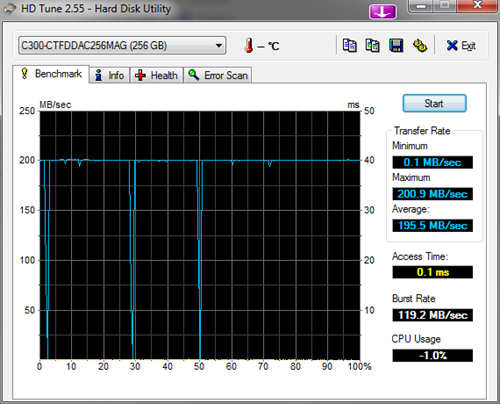
(ASUS P5Q Deluxe, Q9450, 8GB RAM, SSD drive attached to on-board SATA2 controller.
Update 2011-01-01: Note that the measurements were done while testing in IDE mode)The drive came with firmware 002 and after performing a quick “smoke test” I upgraded it to 006. Unfortunately there’s no safe way to go back.
A thread in the Crucial forum contained various tips for a workaround (some of which involved turning of automatic TRIM which others strongly cautioned against). What did help me was to “turn off Windows write-cache buffer flushing on the device” in the device manager:
After I did that the system felt much better, and the benchmark showed no more dramatic spikes:
Of course the warning on the dialog box did not go unnoticed and I hope that Crucial will release a firmware update soon.
But right now the drive (and the overall system) is performing fine.
Update 2011-01-01: The system was originally installed with the drive in AHCI mode, then the drive was switched to IDE during testing. That’s when the benchmarks for the original blog post were run. I’m now back to AHCI mode, here are the benchmark results:
You’ll notice the higher transfer rate; the results would be even better if the drive was attached to a SATA3 controller.
Note that switching the mode (from IDE to AHCI) in the BIOS cleared the “magic” checkbox mentioned in the blog post so at first the system was stuttering again.
-
How to Reach German Developers: dotnet Cologne 2011
If you want to promote tools, technologies, libraries, trainings or anything else of interest to software developers, you want to reach the right audience. Not the 9-to-5 people, but those who have the knowledge and passion that make them important multipliers.
A great way to reach these people are community conferences. They are not the kind of conference that the 9-to-5 folks are “sent to” by their company, but that the right people hear of via Twitter, Facebook, blogs or plain old word-of-mouth and choose to go to, often covering the costs for the day themselves (travel, entrance fee, hotel, taking the day off).
If you want to reach German developers there is one conference that has emerged as the large .NET community conference in Germany, quickly growing beyond being just a local event: The dotnet Cologne, that will be held for the third time on May 6, 2011 and that I’m co-organizing (this interview gives you a good idea of the history).
This year’s dotnet Cologne 2010 with its 300 attendees was a huge success. As in the year before, the conference was sold out weeks in advance, and feedback by attendees and sponsors was positive throughout. And the list of speakers and attendees sounded like a “who is who” of the German .NET community.
Whether you‘d like to present a product, a service or your company: you will meet the right target audience at dotnet Cologne. We’re offering a broad variety of sponsorship opportunities, ranging from being a donor for the large raffle at the end of the day (software licenses, books, training vouchers, etc.) up to having a booth and/or giving a sponsored talk about your product (not necessarily in German, English is not a problem). Among the various sponsorship levels (bronze/silver/gold/platinum) there’s most likely a package that will suit your needs – and if not, we’re open for suggestions.
We’re happy to announce that already at this point in time (with over five months to go) we have a steadily growing list of partners: Microsoft, Intel, IDesign, SubMain, Comma Soft AG, GFU Köln, and EC Software.
If you want to become a sponsor for the dotnet Cologne 2011, drop me a line at Roland.Weigelt at dotnet-koelnbonn.de and I’ll send you our sponsor info.
-
UI/UX-Grundlagen für Entwickler und andere Nicht-Designer
Nachdem ich den Vortrag bereits mit großem Erfolg auf der See# Party in Kreuzlingen (Schweiz) und bei der netug-niederrhein in Krefeld gehalten habe, wird es nun langsam mal Zeit, dass er auch “zu Hause” bei meiner eigenen .NET User Group “Bonn-to-Code.Net” zu hören ist.
23.11.2010 um 19:00 (Einlass ab 18:30)
Bonn Pützchen, in den Räumen der Comma Soft AG
(Infos zur Anfahrt auf der Bonn-to-Code.Net Website)Aus der offziellen Ankündigung:
Viele Entwickler behaupten von sich freimütig, überhaupt kein Gespür für die Gestaltung von Oberflächen zu haben und können mit dem Begriff "User Experience" noch weniger anfangen. Wer es dabei belässt, macht sich die Sache jedoch ein wenig zu einfach, denn häufig ist es nur ein kleiner Schritt von einer schlechten zu einer durchaus akzeptablen GUI.
Dieser Vortrag stellt einige grundlegende Gestaltungsprinzipien vor, gibt praktisch einsetzbare Tipps und klärt u.a. was zugekniffene Augen und das Wissen um Fluchtreflexe mit Usability zu tun haben. Er ist dabei unabhängig von konkreten GUI-Technologien.
Dauer: 2x 45min
-
Emaroo 1.2 Released
Emaroo is a free utility for browsing most recently used (MRU) file lists of
multiple applications. Quickly open files, jump to their folder in Windows Explorer, copy their path - all with just a few keystrokes or mouse clicks.New in this release
- MRU lists can be filtered in real-time by typing parts of file or directory names
- It is now possible to define a list of directories to be excluded from the MRU lists (e.g. to exclude certain drives or UNC paths)
Download and more informationPlease visit the Emaroo website at www.roland-weigelt.de/emaroo
-
Emaroo 1.1 Released

Emaroo is a free utility for browsing most recently used (MRU) file lists of
multiple applications. Quickly open files, jump to their folder in Windows Explorer, copy their path - all with just a few keystrokes or mouse clicks.Features
- Quickly access most recently used Visual Studio / Blend projects and Office documents.
- Open a Window Explorer at the file location
- Copy the file path
- Open Visual Studio 2008 projects in Visual Studio 2010
- Open Visual Studio projects in Expression Blend
- Start Visual Studio / Blend as administrator
- Open recently used directories typed into the address bar of Windows Explorer (New)
Release Notes and Download
- Visit the Emaroo website: www.roland-weigelt.de/emaroo
